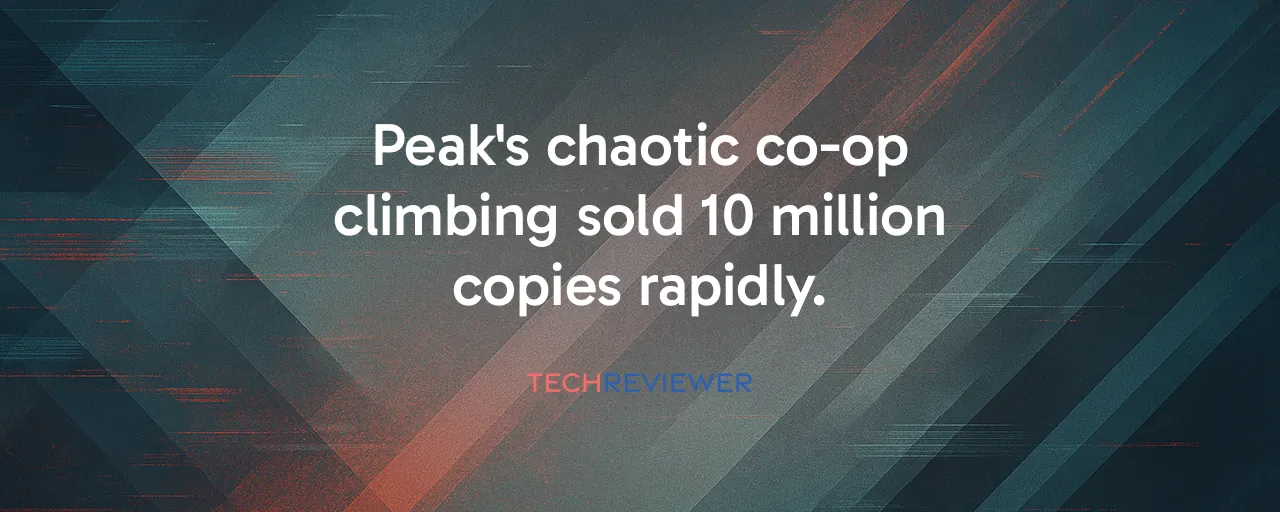A Quick Rise to Viral Success
Peak launched on Steam in June 2025 and sold 100,000 copies in the first day alone. The game came together during a month-long sprint in Seoul by teams from Aggro Crab and Landfall Games. They built it around simple co-op climbing with ragdoll physics, and players responded immediately. Sales hit 1 million in days, reached 4.5 million by July, and now stand at 10 million. Daily players peaked at approximately 170,500 but settled around 21,600 by late October, which still keeps servers active.
The core loop works because friends climb together or fail in funny ways. Proximity voice chat forces groups to stay close, and stamina limits every move. Procedural daily maps mean no two runs feel the same. All this runs on a budget price that encouraged word-of-mouth spread through streams and dorm rooms.
Roots Takes Players Into the Canopy
The update arrives November 5 and swaps desert mesas for giant tree trunks. A teaser shows two climbers perched on bark, one swinging in on a vine before a spider snatches the other. Expect new resources for crafting, protective gear against drops, and obstacles that demand fresh routes.
Mesa added tornadoes and heat mechanics back in August. Roots is expected to rotate with other biomes like Alpine, while Shore and Tropics remain as fixed early zones, though the exact rotation cycle has not been confirmed by developers. Developers haven't locked in the exact cycle, but the biome will likely appear randomly after launch.
Lessons From Mesa and Lethal Company
Mesa taught the team how environmental threats can extend playtime without new maps. Tornadoes pulled players off cliffs, and sunscreen became a required item. Retention held steady for weeks after release, proving hazards beat extra levels for engagement. Roots applies the same idea with spiders and vine swings that change grip physics.
Lethal Company showed a similar path two years earlier. It sold millions on scrap runs and monster chases with basic graphics. Peak borrowed the social focus but added verticality. Both games prove players value group chaos over polish, and regular free updates keep lobbies full longer than paid expansions.
Balancing Act for Small Teams
Aggro Crab and Landfall run separate crews on a new forklift racer, Crashout Crew, while still patching Peak. They added color blindness options in September and an offline pause button after complaints. Public beta branches now catch bugs before they break hardware compatibility.
Session length remains the biggest friction point. Casual runs finish in thirty minutes, but new groups can stretch past an hour. No online pause option frustrates parents or anyone with interruptions. The four-player cap keeps servers stable yet limits big friend circles, though mods push past twenty at the cost of official support.
What Roots Means for the Genre
The Roots biome reinforces Peak's long-term viability and the sustainability of the 'friendslop' model. Procedural generation allows developers to introduce new hazards and layouts without handcrafting entire maps, enabling faster updates and extended content pipelines. Player engagement has naturally declined since mid-year highs, but each major update reignites interest, draws back streamers, and boosts concurrent player counts.
This pattern confirms that consistent, free content updates are more effective for retention than cosmetic monetization or battle passes. The success of Roots, built on responsive design and community feedback, sets a benchmark for indie co-op titles: prioritize social mechanics, maintain technical stability, and ship meaningful content quickly.
